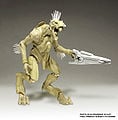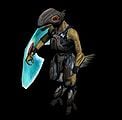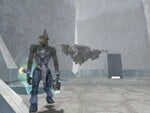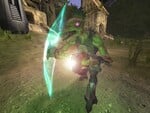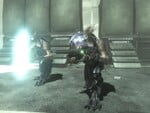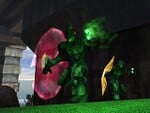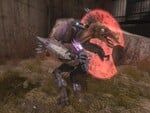Kig-yar: Difference between revisions
From Halopedia, the Halo wiki
(→Trivia) |
|||
| Line 57: | Line 57: | ||
[[File:JackalCloseup.jpg|thumb|right|200px|A closeup on a Kig-yar Jackal's face. Notice the razor-sharp teeth and scaly skin.]] | [[File:JackalCloseup.jpg|thumb|right|200px|A closeup on a Kig-yar Jackal's face. Notice the razor-sharp teeth and scaly skin.]] | ||
Kig-yar are saurian, but they have features similar to birds of prey as well as reptiles. Their legs have muscular thighs, and are triple-jointed and bend backward, in a similar fashion to birds. They have sharp, curved fingernails and toenails. Their beaks are lined with razor-sharp teeth, and it is evident that they are carnivores; Kig-yar have been known to eat the flesh of fallen enemies. Kig-yar are described as having extraordinary senses of sight, hearing, and smell. Though they are not a low-gravity species, they do have many qualities that are shared with species from low-g worlds. The female of the species lack the spiny plumage (said plumage's color serving as indication of the Kig-yar's mood)<ref name="Contact">'''''[[Halo: Contact Harvest]]''''', pages 56/58</ref> of the male; replacing it with calloused plates at the forearms and the rear of the head. This thick skin helps protect the female during courtship. Kig-yar reproduce by laying eggs. When mating, the male can choose to fertilize the egg, in which a male is produced, whereas if the eggs are not fertilized a female is produced. | Kig-yar are saurian, but they have features similar to birds of prey as well as reptiles. Their legs are sinewy and have muscular thighs, and are triple-jointed and bend backward, in a similar fashion to birds. They have sharp, curved fingernails and toenails. Their beaks are lined with razor-sharp teeth, and it is evident that they are carnivores; Kig-yar have been known to eat the flesh of fallen enemies. Kig-yar are described as having extraordinary senses of sight, hearing, and smell. Though they are not a low-gravity species, they do have many qualities that are shared with species from low-g worlds. The female of the species lack the spiny plumage (said plumage's color serving as indication of the Kig-yar's mood)<ref name="Contact">'''''[[Halo: Contact Harvest]]''''', pages 56/58</ref> of the male; replacing it with calloused plates at the forearms and the rear of the head. This thick skin helps protect the female during courtship; when mating, the male will often chew on the back of the female's head, neck, and arms. Kig-yar reproduce by laying eggs which the female incubates, similar to birds. When mating, the male can choose to fertilize the egg, in which a male is produced, whereas if the eggs are not fertilized a female is produced. | ||
Kig-yar skin is scaly and is tough enough to allow the Kig-yar to fight without wearing any kind of foot protection. Their blood is bright purple in color, similar to that of the [[Sangheili]], possibly showing a similar chemical makeup. The lack of calcium in their skeletons makes them a poor source of food for potential [[Flood]] forms. However, they have been utilized as [[Flood Combat Form|combat forms]] during at least one [[Battle of the Flood-controlled Shield World|engagement]]. <ref>''[[Halo Wars]]''</ref>. | Kig-yar skin is scaly and is tough enough to allow the Kig-yar to fight without wearing any kind of arm or foot protection. Their blood is bright purple in color, similar to that of the [[Sangheili]], possibly showing a similar chemical makeup. The lack of calcium in their skeletons makes them a poor source of food for potential [[Flood]] forms. However, they have been utilized as [[Flood Combat Form|combat forms]] during at least one [[Battle of the Flood-controlled Shield World|engagement]]. <ref>''[[Halo Wars]]''</ref>. | ||
There is a great deal of physiological disparity among the Kig-yar. Some specimens, most notably the Skirmishers, possess a more squared cranial structure from typical Jackals, while others have slighter, more avian heads. The Skirmishers, unlike most Kig-yar, are more heavily built and feature a feathery plumage rather than quills. Many Kig-yar, including both Jackals and Skirmishers, possess red, gray, green, or golden skin, and, in the case of Skirmishers, similarly colored feather plumages. This physiological diversity is likely due to uneven distribution across many worlds and drastically varied environments.<ref>[http://halo.xbox.com/en-us#/intel/theuniverse/characters/video/the-jackals/24dc0ecc-8cf0-473a-aae3-266fe6019d61?filter=all '''Halo Waypoint:''' ''Kig-yar'']</ref> | There is a great deal of physiological disparity among the Kig-yar. Some specimens, most notably the Skirmishers, possess a more squared cranial structure from typical Jackals, while others have slighter, more avian heads. The Skirmishers, unlike most Kig-yar, are more heavily built and feature a feathery plumage rather than fleshy quills. Many Kig-yar, including both Jackals and Skirmishers, possess red, gray, green, pale brown, tan, yellow, or golden skin, and, in the case of Skirmishers, similarly colored feather plumages. This physiological diversity is likely due to uneven distribution across many worlds and drastically varied environments.<ref>[http://halo.xbox.com/en-us#/intel/theuniverse/characters/video/the-jackals/24dc0ecc-8cf0-473a-aae3-266fe6019d61?filter=all '''Halo Waypoint:''' ''Kig-yar'']</ref> | ||
{{SectStub}} | {{SectStub}} | ||
Revision as of 08:57, November 7, 2010
| This article does not meet the wiki's general standards and/or standards on layouts. You can help by cleaning this article. |
Template:Covenant Species Infobox
- "Jackals may be superior marksmen and they're very sneaky, but that doesn't make them excellent snipers — they’re a little too bloodthirsty for that."
- — Anonymous UNSC serviceman
The Kig-yar (Latin: Perosus latrunculus, translated to "Hateful Highwayman"[1]) are a saurian species[2] which serve the Covenant, and later the Covenant Loyalists, as mercenaries and privateers. Humans have termed the two races of these these vicious creatures Jackals and Skirmishers, as they are known for their swiftness, viciousness, and dexterity, despite their physical frailty. In combat, Kig-yar serve as either snipers or scouts within the Covenant due to their excellent senses of sight, smell, and hearing.
History
Once, the Kig-yar culture was centered around rival clans sailing across Eayn's seas as pirates, raiding the encampments and settlements of rival clans. As the distances between the clans diminished, so too did the differences, and a united Kig-yar race reached out to the stars in spacecraft, beginning to populate small asteroids around Chu'ot. Some of these saw opportunity, and became pirates once more, raiding merchant ships. These were apparently the Kig-yar's only effective response to the overwhelming Covenant military juggernaut when they arrived in their home-system in 1342. The war between the two factions culminated around sieges of redoubts on the asteroids surrounding their world. Eventually, in order to survive, they accepted Letters of Marque: commissions from the Ministry of Tranquility to engage in the services of the Covenant, though often this was merely used as an excuse to continue raiding. The Kig-yar spent much of this time preying on the ships of the Covenant's enemies, such as the humans.
Though they theoretically stand as equals of the Unggoy, the Kig-yar are actually in an elevated position, as most of the other races ignore the Unggoy, while the Kig-yar are purposefully cruel to them to reassure themselves of their own superiority. This reached a boiling point in 2462, when some Kig-yar attempted to poison recreational narcotics the Unggoy enjoyed which would have left the Unggoy sterile, in retaliation for the Unggoy encroaching on their habitats and displacing Kig-yar nests. Although a junior staffer in the Ministry of Concert found evidence of this, the High Council failed to properly investigate the incident, culminating in the Unggoy Rebellion.
Following the outbreak of the Human-Covenant War, a group of Kig-yar under Reth made contact with the Rubble, made of human survivors of the glassing of Madrigal, trading Covenant weaponry in exchange for slipspace drives. Although the humans believe the Kig-yar were defying Covenant authority, they were in fact proceeding with the blessing of the High Prophet of Truth to use the weapons to map UNSC space and learn the location of Earth. The plan fell apart during due to the High Prophet of Regret sending Sangheili warriors to investigate the weapons, believing the Kig-yar to be heretics.
During the Great Schism, the Kig-yar sided with the Loyalists against the Covenant Separatists.
Description
Anatomy and Physiology
Kig-yar are saurian, but they have features similar to birds of prey as well as reptiles. Their legs are sinewy and have muscular thighs, and are triple-jointed and bend backward, in a similar fashion to birds. They have sharp, curved fingernails and toenails. Their beaks are lined with razor-sharp teeth, and it is evident that they are carnivores; Kig-yar have been known to eat the flesh of fallen enemies. Kig-yar are described as having extraordinary senses of sight, hearing, and smell. Though they are not a low-gravity species, they do have many qualities that are shared with species from low-g worlds. The female of the species lack the spiny plumage (said plumage's color serving as indication of the Kig-yar's mood)[3] of the male; replacing it with calloused plates at the forearms and the rear of the head. This thick skin helps protect the female during courtship; when mating, the male will often chew on the back of the female's head, neck, and arms. Kig-yar reproduce by laying eggs which the female incubates, similar to birds. When mating, the male can choose to fertilize the egg, in which a male is produced, whereas if the eggs are not fertilized a female is produced.
Kig-yar skin is scaly and is tough enough to allow the Kig-yar to fight without wearing any kind of arm or foot protection. Their blood is bright purple in color, similar to that of the Sangheili, possibly showing a similar chemical makeup. The lack of calcium in their skeletons makes them a poor source of food for potential Flood forms. However, they have been utilized as combat forms during at least one engagement. [4].
There is a great deal of physiological disparity among the Kig-yar. Some specimens, most notably the Skirmishers, possess a more squared cranial structure from typical Jackals, while others have slighter, more avian heads. The Skirmishers, unlike most Kig-yar, are more heavily built and feature a feathery plumage rather than fleshy quills. Many Kig-yar, including both Jackals and Skirmishers, possess red, gray, green, pale brown, tan, yellow, or golden skin, and, in the case of Skirmishers, similarly colored feather plumages. This physiological diversity is likely due to uneven distribution across many worlds and drastically varied environments.[5] Template:SectStub
Culture
Unlike other Covenant client races such as the Unggoy, Kig-yar were space-faring long before joining the Covenant. As such, the Kig-yar are unique among Covenant races: rather than being faithful followers of the Prophets' religion, they are mercenaries paid by the Covenant. However, due to the long time they have been in the Covenant, a large number of them have accepted the Covenant religion. Kig-yar have been known to coexist relatively peacefully with humans, as evidenced by the relationship between the Rubble and Reth's forces on Metisette. When the Kig-yar were finally ordered by the Prophets to attack and destroy the humans of the Rubble, many of them even regretted the order. This is likely due to the pragmatic, mercantile culture of their race: As long as it benefits them economically, Kig-yar will co-operate with nearly any group, even declared enemies of the Covenant.
Role within The Covenant
Kig-yar serve primarily as infantry, police forces and overseers. They also commonly crew Covenant Missionary Ships, such as the Minor Transgression.
Within Covenant society, Kig-yar have little status and are subservient to all but the Unggoy. Because of this, Kig-yar frequently harass Unggoy to assert what little authority they have. In some cases, Sangheili or Jiralhanae dispose of criminals or prisoners by feeding them to Kig-yar convicts, who eat the victim alive.
Kig-yar are extremely cruel to members of other species; this is evidenced by their willingness to eat Unggoy and humans alive, and the way they abuse Yanme'e Unmutuals, as shown in Halo: Evolutions.
The Kig-yar are not represented on the High Council but are instead vetted by the Ministry of Concert. The Kig-yar do not vocally complain about their position but instead have selected to siphon off resources to their brethren. Whether the Covenant leadership was aware of this is currently unknown.
Government
The Kig-yar government is a post-industrial capitalist system, with a population of 978 million.[6] It is also described as an ochlocracy, a system of government best described as a government by mob, or the intimidation of constitutional authorities. Presumably, this implies that whatever form of local government the Kig-yar possess is ineffective and ignored. Template:SectStub
Naming
Kig-yar names usually consist of a single syllable, with two consonants and one vowel, such as Yeg, Jak and Bok. However, Chur'R-Yar and Chur'R-Mut, who were both Shipmistresses, have multiple syllables in their names. It is speculated that the Kig-yar naming system is at least partially based on sex, rank, or both.
Homeworld
- Main article: Eayn
Eayn is the homeworld of the Kig-yar species and is the primary satellite of the planet Chu'ot. It is characterized by its single equatorial ocean, sparse volcanism, and almost total lack of glaciation. Only about one-third of all Kig-yar who still reside in the Y'deio system call Eayn their home; many have chosen to live among the minor planets within the asteroid belt since their initial contact with the Covenant.
Rank Structure
"Jackal" ranks
| Rank | Image | Description |
|---|---|---|
| Jackal Leaders | ||
| Jackal zealot | Little is known of the Kig-yar Zealot's role. The only known Kig-yar Zealot is Zhar[3]. | |
| Jackal Specialists | ||
| Jackal Ranger | File:Jackal Rangers.jpg | Jackal Rangers are trained for zero-G EVA combat, and are equipped with vacuum suits and magnetic boots. |
| Jackal Sniper | 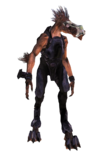
|
Sniper Jackals are the Covenant's foremost long-range combatants. They are known to carry weapons such as needle rifles and beam rifles, but do not use point-defense gauntlets as to better wield their weapon. |
| Jackal Infantry | ||
| Jackal Major | 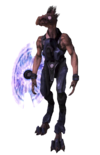
|
Major Jackals are more experienced than Minors and are issued stronger point-defense gauntlets that emit a violet-colored shield post Great Schism and an orange or red colored shield pre Great Schism. They typically carry plasma pistols and needlers. |
| Jackal Minor | 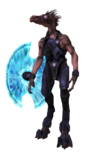
|
The rank of Minor is the lowest field rank a Jackal can attain. They are armed with standard-strength, light blue point defense gauntlets and small arms such as the plasma pistol or needler. |
"Skirmisher" ranks
| Rank | Image | Description |
|---|---|---|
| Skirmisher Leaders | ||
| Skirmisher Champion | 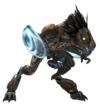
|
The Champion is the highest rank of the Skirmishers, a specialized group of shock troops comprising of more heavily built Kig-yar, deployed on the ground for their viciousness and fierce tactics. Members of this rank have bright red armor, a helmet, and shields. They appear to be the leading rank of Skirmishers, being neither infantry nor specialists. |
| Skirmisher Specialists | ||
| Skirmisher Commando | File:Skirmishercommando.jpg | Members of this rank have bright green armor and a helmet, and will occasionally use holograms to deceive the enemy. |
| Skirmisher Murmillo | 
|
Members of this rank have gold armor, helmets, and occasionally elbow shields. |
| Skirmisher Infantry | ||
| Skirmisher Major | 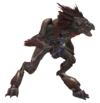
|
Members of this rank have red feathers and red-gray armor. |
| Skirmisher Minor | 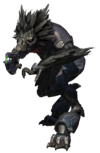
|
The lowest rank of Skirmisher; members of this rank have black feathers and gray armor. |
Template:Jackal Ranks Template:SectStub
Trivia
- The Kig-yar were the first Covenant species fought by human beings. Staff Sergeants Avery Johnson and Nolan Byrne fought two and killed both of them in the skirmish over Harvest, shortly before the First Battle of Harvest. Later, they became the first Covenant species encountered by the SPARTAN-IIs aboard the Unrelenting at Chi Ceti IV.[7]
- The name "Jackal" comes from a wild dog that is similar to the coyote, and is a reference to their scavenger appearance and nature.
- "Kig-yar" is Breton for "chicken" and Phonetic Welsh for "chicken meat".[citation needed]
- Chur'R-Yar and Chur'R-Mut are the only known female Kig-yar, and were also the first two female Covenant characters to appear in Halo canon.
- Although Jackals carry grenades in Halo 2 , they are never seen using them. This is possibly because of the fact that, in terms of game mechanics, they 'dual-wield' their energy shield with whatever other weapon they are carrying.
- In-game, all Jackals shoot left-handed and are the only Covenant species to do so (with the exception of Rtas 'Vadumee). However, in Halo: Reach Jackals shoot with their right hands, and carry their shields with their left.
- Kig-yar possess a salty, occasionally acrid smell.[2]
- A melee can kill them instantly, so use this advantage when near them.
- There are Jackals that do not have the bright spines of most of their kind. These could be females.
- In game, Jackals do not use melee attacks, even against Marines/Army Troopers. However, in Contact Harvest, a disarmed Jackal attempted to attack Avery Johnson with its claws, right before it was killed.
- Jackals are unique as the only common Covenant species that does not speak understandable language at one point in the series. All other common species (Sangheili, Jiralhanae, even Unggoy) have been observed speaking human languages, though it could have been translated.
Mistakes
- In Halo: The Fall of Reach, their blood is said to be blue, despite its actual purple coloration.[8]
- The first time Jackals are encountered in-game is in Halo: Combat Evolved on the level Halo. They do not appear in the first level, Pillar of Autumn, due to the Covenant's mistrust of them being on enemy vessels because of their pirating ways. However, in The Flood, they are mentioned as boarding the Template:UNSCship during their initial attack.
Gallery
Jackal in the level Assault on the Control Room in Halo: Combat Evolved.
- Jackal Lakeside.jpg
A Kig-yar Sniper from Halo 2 wields a particle beam rifle.
- 1215645880 Jackal Blood.jpg
A Jackal's blood stain.
- 19317669-Full.jpg
A Kig-yar Minor on patrol on The Ark in Halo 3.
- SHARPSHOOTER!.jpg
A Kig-yar sniper with a Beam Rifle in Halo 3: ODST.
A Kig-Yar lance armed with Plasma Pistols and Point Defense Gauntlets as seen in Halo 3: ODST.
- Cov jackalfinal.jpg
Concept art of the Kig-yar for Halo Wars.
A Kig-yar Major in Halo: Reach.
Sources
- ^ HBO Forums
- ^ a b Bungie.net: ODST Guide
- ^ a b Halo: Contact Harvest, pages 56/58
- ^ Halo Wars
- ^ Halo Waypoint: Kig-yar
- ^ Bestiarum
- ^ Halo: The Fall of Reach, pages 125/126
- ^ The Fall of Reach, page 327


